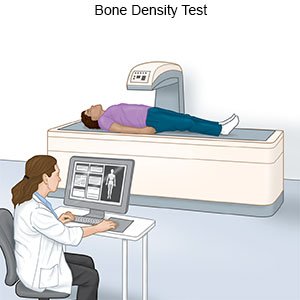Screening for Osteoporosis
Medically reviewed by Drugs.com. Last updated on Sep 23, 2025.
What do I need to know about screening for osteoporosis?
Screening means you are checked for osteoporosis even though you do not have symptoms. The results can help start treatment early, if needed. If results show you do not have osteoporosis, you can take steps to help prevent it.
What do I need to know about osteoporosis?
- Osteoporosis is a long-term medical condition. Your bones become weak, brittle, and more likely to fracture.
- You may have osteoporosis and not know it. You may not develop symptoms. Your healthcare provider may only find osteoporosis after you break a bone. A break usually occurs in the hip, spine, or wrist. You may have back pain or lose height as you lose bone in your spine.
What increases my risk for osteoporosis?
- Age older than 60
- Female sex, or a low estrogen level
- A family history of osteoporosis
- Low body weight, lack of weight-bearing exercise, or not enough calcium and vitamin D
- Pregnancy
- Alcohol, tobacco, or caffeine use
- Conditions such as thyroid disease, rheumatoid arthritis, HIV, diabetes, or bone cancer
- Certain medicines, such as steroids, loop diuretics, proton pump inhibitors, anticonvulsants, or blood thinners
Related medications
Am I a good candidate for osteoporosis screening?
The following are reasons you may be a good candidate for screening:
- You are at risk for osteoporosis, but you do not have any signs or symptoms.
- You do not have a history of fractures caused by fragility.
- You are female and 65 years or older.
- You are female, younger than 65, have been through menopause, and have at least 1 osteoporosis risk factor.
- You have a family history of osteoporosis.
- You are male and have a high risk for osteoporosis. Screening is not routinely recommended, but you and your provider may make a decision for you to have screening.
How is screening done?
Screening tests depend on your age, sex, and overall risk for osteoporosis. The following are common ways screening may be done:
- A bone density test compares your bone thickness with what is expected for someone of your age, sex, and ethnicity. You will lie on a table for this test. A scanner will pass over the area and take x-ray pictures. The pictures will show if your bones have lost minerals, such as calcium. A bone density test is usually done on the hip, spine, or forearm.

- A quantitative ultrasound (QUS) may be used to check for bone loss in your heel. If the QUS finds bone loss, a bone density test may be needed.
- A risk assessment tool may be used to determine your risk for a fracture within the next 10 years. The risk is based on factors such as your age, sex, height, weight, other medical conditions, and medicines. Lifestyle factors are also considered, such as how physically active you are, and if you drink alcohol or smoke cigarettes.
What are the risks of osteoporosis screening?
- A false-negative result can happen. The result can delay treatment because no osteoporosis was found. It may cause you to not seek treatment even when you have symptoms.
- A false-positive result can happen. This result can cause you to have more tests or treatments you do not need. It can also cause you to feel anxious if you think you have osteoporosis.
What should I ask my healthcare provider before I decide to have osteoporosis screening?
- How high is my risk for osteoporosis?
- Will my insurance cover screening?
- Where is the screening done?
- Do I need to do anything to get ready to have screening? What should I wear?
- When and how do I get the results of my screening?
- Will I need ongoing screening?
Care Agreement
You have the right to help plan your care. Learn about your health condition and how it may be treated. Discuss treatment options with your healthcare providers to decide what care you want to receive. You always have the right to refuse treatment. The above information is an educational aid only. It is not intended as medical advice for individual conditions or treatments. Talk to your doctor, nurse or pharmacist before following any medical regimen to see if it is safe and effective for you.© Copyright Merative 2025 Information is for End User's use only and may not be sold, redistributed or otherwise used for commercial purposes.
Further information
Always consult your healthcare provider to ensure the information displayed on this page applies to your personal circumstances.
